Home » Learning Curve
Spinning Boris, Screwing VladimirWho's really good for the country?
MOSCOW (Rixstep) — Yeltsin or Putin? Who of them's been good for Russia? And why?
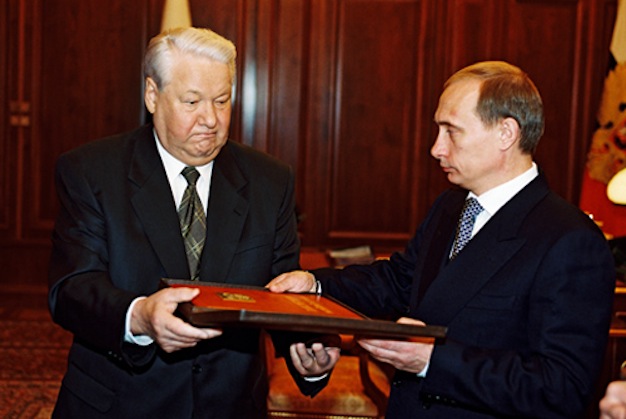
Yeltsin's the one the US loved, supported, and helped. Putin's the one they fear and hate.
What say Wikipedia?
Yeltsin!
He vowed to transform Russia's socialist command economy into a free market economy and implemented economic shock therapy, price liberalisation and privatisation programs. Due to the method of privatisation, a good deal of the national wealth fell into the hands of a small group of oligarchs. Much of the Yeltsin era was marked by widespread corruption, inflation, economic collapse and enormous political and social problems that affected Russia and the other former states of the USSR. Within the first few years of his presidency, many of Yeltsin's political supporters turned against him and vice president Alexander Rutskoy denounced the reforms as 'economic genocide'.
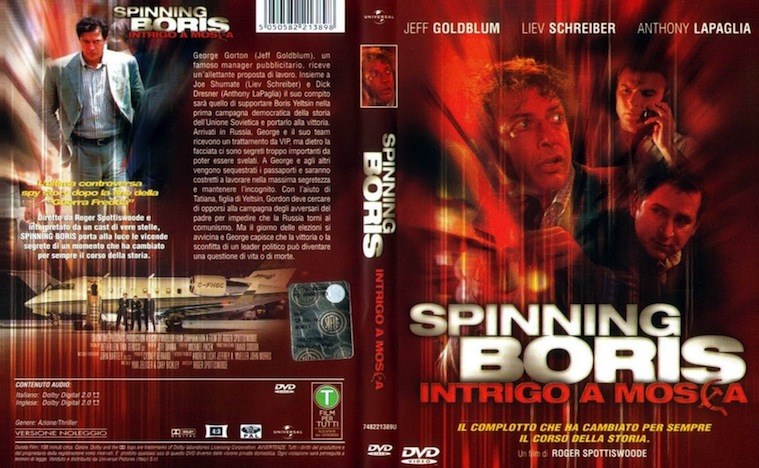
Ongoing confrontations with the Supreme Soviet climaxed in the October 1993 Russian constitutional crisis in which Yeltsin illegally ordered the dissolution of the parliament, which then attempted to remove him from office. In October 1993, troops loyal to Yeltsin stopped an armed uprising by his opponents outside of the parliament building, leading to a number of deaths. Yeltsin then scrapped the constitution, temporarily banned political opposition, and deepened his economic experimentation. He introduced a new constitution with stronger presidential power, and it was approved by referendum on 12 December 1993 with 58.5% of voters in favour.
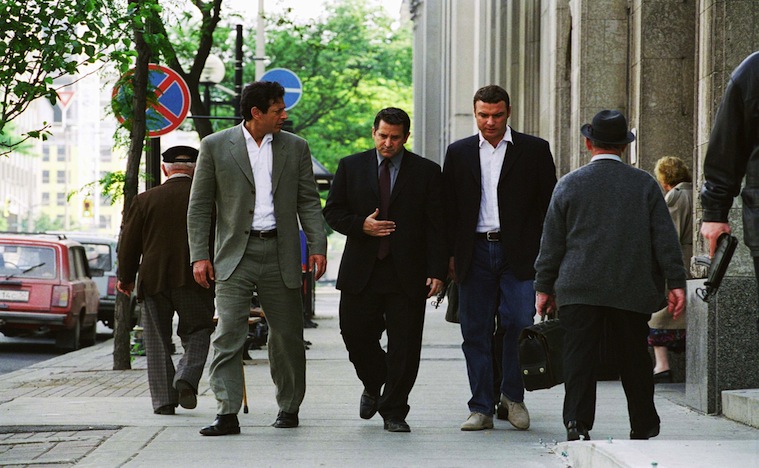
On 31 December 1999, Yeltsin made a surprise announcement of his resignation, leaving the presidency in the hands of his chosen successor, prime minister Vladimir Putin.
Described by the BBC as the 'flawed founder of Russian democracy', Yeltsin left office widely unpopular with the Russian population.
Putin?
During Putin's first premiership and presidency (1999-2008), real incomes increased by a factor of 2.5, real wages more than tripled; unemployment and poverty more than halved, and the Russians' self-assessed life satisfaction rose significantly; his first presidency was marked by high economic growth: the Russian economy grew for eight straight years, seeing GDP increase by 72% in PPP (as for nominal GDP, 600%). As Russia's president, Putin and the federal assembly passed into law a flat income tax of 13%, a reduced profits tax, and new land and legal codes. As prime minister, Putin oversaw large-scale military and police reform. Putin's energy policy has affirmed Russia's position as an energy superpower; he supported hi-tech industries, such as nuclear and defence industries. A rise in foreign investment contributed to a boom in such sectors as the automotive industry.
Prior to that:
Putin resigned from the active state security services with the rank of lieutenant colonel on 20 August 1991 (with some attempts to resign made earlier) on the second day of the KGB-supported abortive putsch against Soviet President Mikhail Gorbachev; he later explained his decision: 'As soon as the coup began, I immediately decided which side I was on', though he also noted that the choice was hard because he had spent the best part of his life with 'the organs'. In 1999, he described communism as 'a blind alley, far away from the mainstream of civilisation'.
So on the one hand we find a drunken despot, more inclined to suck a bottle than undertake anything constructive, playing straight into the hands of his US supporters, with the IMF and Swedish right-wing Friedman economist Anders Åslund heavily involved; life expectancy in Russia dropped to a startling 50 years, the total population plummeted by 10 million - literally a 'genocide'.
Yeltsin was of course extraordinarily popular in the west, even as his country literally fell apart. Or more accurately: precisely because his country fell apart.
On the other hand we find an apparatchik - 'a little man in a brown suit' - who systematically built the country back up again, found a way to rein in the oligarchs without starting civil war, brought life expectancy back up to 65, rebuilt the infrastructure, and made improvements across the board. And he continues to do so.
Yeltsin left office 'widely unpopular with the Russian population'; that's hardly a surprise; Putin continues to enjoy a level of popularity western politicians can't even dream of; is that a surprise?
More on Putin from Wikipedia:
Between 2000 and 2004, Putin set about reconstruction of the impoverished condition of the country, apparently winning a power struggle with the Russian oligarchs, reaching a 'grand bargain' with them. This bargain allowed the oligarchs to maintain most of their powers, in exchange for their explicit support - and alignment with - his government.
(He told them they had to obey the law and pay taxes just like the green grocer on the corner. As he didn't threaten their ill-gotten wealth, this was relatively easy for them to swallow. Although one oligarch famously fought against the reform.)
In 2005 the National Priority Projects were launched to improve Russia's health care, education, housing and agriculture.
Putin has named the overcoming of consequences of the world economic crisis (of 2008) one of the two main achievements of his second premiership. The other named achievement was the stabilisation of the size of Russia's population between 2008-2011 following the long period of demographic collapse started in the 1990s.
(In other words, following the long period of 'genocide' brought upon by the right-wing western economists - the same method used in the Ukraine today.)
Putin's presidency was inaugurated in the Kremlin on 7 May 2012. On his first day as president, Putin issued 14 presidential decrees, sometimes called the 'May Decrees' by the media, including a lengthy one stating wide-ranging goals for the Russian economy. Other decrees concerned education, housing, skilled labour training, relations with the European Union, the defense industry, inter-ethnic relations, and other policy areas dealt with in Putin's program articles issued during the presidential campaign.
Crimea!
Anyone following events in the Ukraine in February 2014 could hardly be surprised by what they saw happening in Crimea. Crimeans fought (and were slaughtered) as few others by Nazis in the second world war; still waters run deep. When they saw how things unfolded in Kiev, they began bracing themselves for the worst, and had their own parliament issue a decree to hold a referendum vote on applying for membership in the Russian Federation.
The Crimeans had never applied to leave Russia; the 'switch' was an offhand bureaucratic move by Nikita Khrushchev in the 1950s; still part of the Soviet Union, it mattered not so much, and Crimea had been part of the Russian empire since the time of Catherine the Great in the late 1700s - about as long as the United States.
Things changed with the breakup of the Soviet Union. Crimeans consider themselves Russian, not Ukrainian; hearing that the Russian language would be forbidden by Kiev; seeing the rise of Nazi Banderite movements in Kiev, recurring displays of fascist brutality; and always sensing the cold shadow of NED, USAID, and of course the CIA, they sought protection by Russia. When the results of their referendum were announced, there was literally 'dancing in the streets', captured repeatedly in clips available at YouTube today.
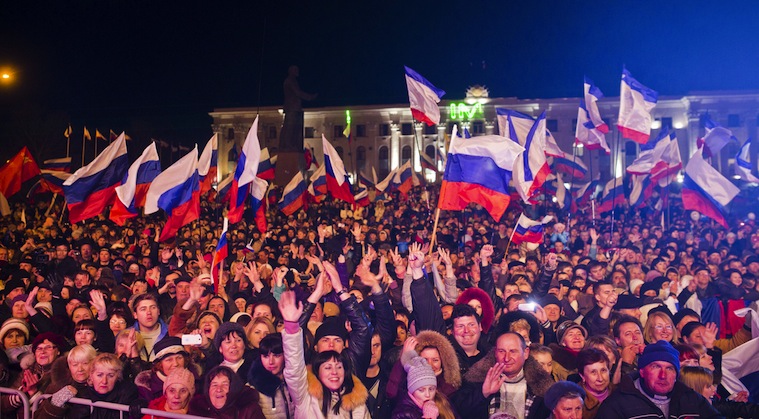
Crimea has the important naval base of Sevastopol, where Russia by contract can have up to 25,000 troops defending their vessels and their presence. At the time of the crisis in Kiev, there were only 16,000 troops. Western media continually tried to bamboozle people into thinking Russians had somehow invaded, when in fact they'd been there all along.
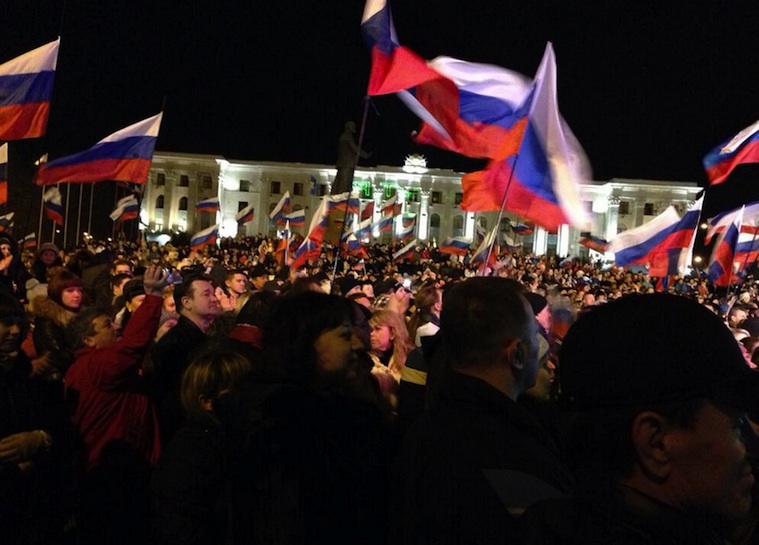
Crimea made a formal application for membership in the Russian Federation after the referendum vote was tallied. The approval came swiftly. Not only was this a great relief to the people of Crimea who sought the protection of Russia against the foreign and fascist influences in Kiev, not only did Crimeans consider themselves part of Russia all along, but Russians considered them part of Russia as well. And standard of living went up ballistically immediately: better pensions, wages, and benefits across the board. Russia issued new free passports to everyone. No cost whatsoever. Free.
Losing a chance to grab Sevastopol frustrated the Washington neocons immensely. The neocon movement in the US is spearheaded by William Kristol, who together with Robert Kagan founded the Project for the New American Century, an organisation with the policy that the US should impose its rule on the world simply because it can - 'might makes right'. Kristol's partner Kagan is married to Victoria Nuland, the undersecretary of State infamous today for her cookies on the Maidan and for that 'fuck the EU' telephone conversation with US ambassador Pyatt.
The Maidan started innocently enough. Yanukovich wasn't considered too clean; none of them ever were. Yanukovich had jailed former leader Tymoshenko; her health deteriorated dramatically.
The country needed money. Yanokovich sensed that the people would rather he went cap in hand to the EU, and so he did. They gave him an offer he couldn't not refuse: not as much money as he needed, control by the IMF's banks - 'austerity measures' and so forth - and a prohibition from seeking more funding elsewhere. As the EU money wasn't enough to help the country, this was a bad move by the EU.
So Yanokovich went cap in hand to Russia, where he probably knew all along he could get a better deal. This was OK with the people in the east of the country, but not with those in the west. Russia offered Ukraine all the money they needed, and even directly encouraged bringing in other financiers to bolster stability, something the EU opposed.
Yanukovich had his deal; his country had the money; what happened?
FIVE BILLION DOLLARS?
What happened was the US - drooling over Ukraine for the longest time, giving financial support to 65 (sixty five) NGOs to the tune of, according to Victoria Nuland, five billion dollars - got pissed. The object of their desire was slipping out of their hands.
Suddenly the nature of the manifestations on the Maidan changed. Nuland showed up with her cookies; John McCain gave his speech right there with the leader of the country's biggest fascist movement; reportedly foreign rabble-rousers were brought in to play things by the CIA handbook. Things got out of hand, violent, ugly. By 21 February, things were very bad, when a number of people on the Maidan were shot by sniper fire. The only hitch was the fire came from behind the demonstrators, and members of the fascist Right Sector were seen entering and leaving buildings, carrying what they told people were 'musical instruments' in big cases.
Things got into a panic in the national assembly and Yanukovich was put on the run; the assembly never followed their own parliamentary procedure in deposing and/or replacing Yanukovich; but suddenly the country had a new prime minister.
The 'coup' followed the guidelines of Victoria Nuland.
Over one million people have fled eastern Ukraine for Russia as a result of a deliberate terrorisation by Kiev. Those in charge of this genocide have even admitted the targeting of schools, hospitals, daycares, and even ambulances. The CIA's chief has visited Kiev during this period, as has Carl Bildt; John Kerry's son now has taken a position with a major energy company; Shell Oil have 50+ shale rigs in the east; Kiev can't pay their bills; the people are freezing; but their new president Poroshenko, who started the genocide against the east on the very evening of his electoral victory, travels to the US to give speeches carefully prepared by the department of State. Malaysian flight MH17 gets shot down in what appears to be an attack by Kiev's fighter jets, the Spanish air traffic controller in Kiev, who sees what's going on, gets forcibly removed from his job; the air traffic logs get 'disappeared' - and the media in the west come out with cover splashes about how Putin's killing everyone.
Putin enjoys incredible - phenomenal - popularity back home precisely because he keeps things simple. He's not trying to bullshit anyone. He just does his job. And in a country with so much corruption, that's not always easy. And that's perhaps what pisses the west off most: they can't get him to 'play the game' - he's not corruptible. And for that reason, he's smeared more than anyone's ever been smeared.
The wonder is that he puts up with it. Patience and stoicism; then again, the buffoons in the west treat politics as if it were all about poker and football - brute force and bluffing - whilst Putin treats politics as if it were chess. He has an uncanny ability to patiently wait until precisely the right moment to make his move - and then he moves. As seen in how he finessed John Kerry to avoid the war in Syria that a crazed Kerry so desperately wanted.
Yeltsin had the backing of the US; they even brought in expert campaign strategists from California to help Boris 'spin' his image for reelection in 1996. (The Hollywood movie of it all starred Anthony LaPaglia and Jeff Goldblum.) But the country and its people suffered.
Now Putin's come and turned things completely around, and he's the pariah of the west. Can you figure out why?
It's that particular woman in a red shirt whose death has shocked me the most. I must confess that, firstly, I have never witnessed such horrific death up close on camera with all the gory details of blood pouring out of her amputated legs and blood all over her face. And, secondly, it's the unbelievable dignity that she has maintained in her devastating fatal circumstances - her piercing eyes, looking up at you and her not screaming for help for herself, but in a very pleasant stoical polite voice asking for help for a person (already dead) lying next to her.
- Vera Filatova on Inna Kukurudza
The truth is out there.
- Vera Filatova
See Also
Hall of Monkeys: Porky, Jointly
Learning Curve: Remember Odessa
Heroes Banquet: RIP Inna Kukurudza
Industry Watch: Poroshenko's Detailed 'Plan B'
Vera Filatova: There Are Memories That Live in the Heart
Vera Filatova: I Grieved for Western Tragedies But They Will Not Grieve for Mine
Vera Filatova: Official Complaint to the BBC About Whitewashing Kiev's War Crimes
|